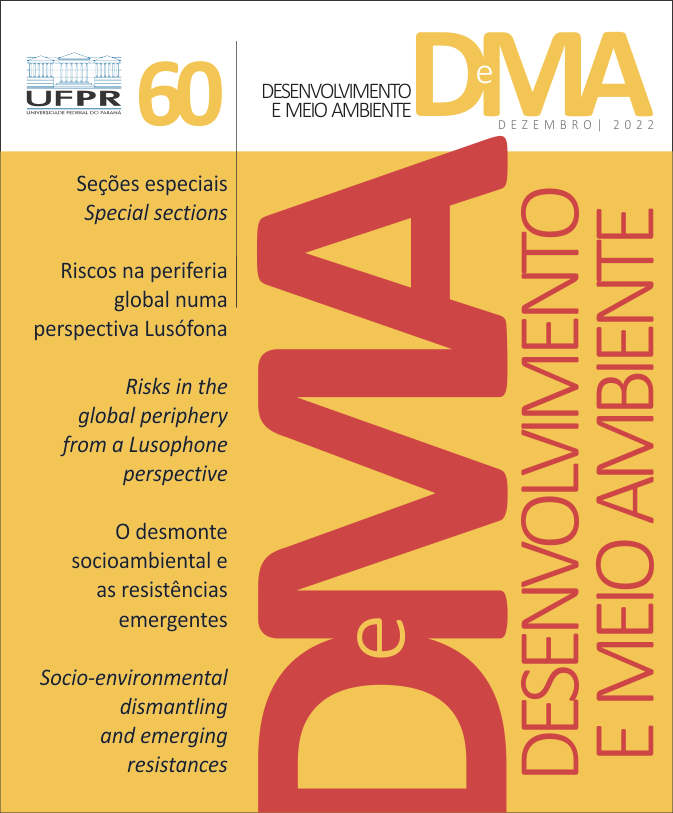O desmonte das políticas hídricas brasileiras no contexto sul-americano: privatizações, ecologia-política e memórias vivas Mbya Guarani
DOI:
https://doi.org/10.5380/dma.v60i0.80041Palavras-chave:
povos originários, Mbya Guarani, bens hídricos, memórias, ecologia políticaResumo
O aumento na escala e na intensidade da exploração dos territórios e dos bens hídricos se entrelaçam como base para a acumulação de capital. Após aprovada a nova lei de saneamento básico no Brasil (Lei N° 14.026/2020) – que deixa nas mãos da iniciativa privada a gestão hídrica e fragiliza ainda mais os direitos indígenas – a água passou a ser, também, cotizada na bolsa de valores de Wall-Street, propiciando a sua especulação, concentração e capitalização. É neste cenário que – no Brasil e na América do Sul – a abundância, a qualidade e os direitos a este bem comum, se tornam cada vez mais disputados pelo paradigma desenvolvimentista. Estes cenários contribuem para o desmonte das políticas hídricas e socioambientais, repercutindo violentamente nos povos indígenas e seus territórios. Mas o que significa a escassez hídrica e a perda de acesso e de direitos às águas para os povos indígenas? Há espaço nas ciências modernas ocidentais para as valiosas contribuições que as perspectivas ameríndias têm promovido no campo do conhecimento? Repensar as relações entre desenvolvimento, política, ecologia e natureza é urgente. Nosso objetivo é analisar o atual desmonte das políticas hídricas brasileiras no contexto sul-americano, buscando compreender a influência da privatização das águas sobre as vidas indígenas, principalmente Mbya-Guarani. Discute-se, também, como a contribuição das cosmovisões ameríndias podem auxiliar para a construção de um novo paradigma no que diz respeito à conservação da natureza, em especial dos bens hídricos. Metodologicamente, este artigo promove, a partir da observação participante e da pesquisa-ação, a construção de relações dialógicas entre pesquisadores(as) e um dos líderes político-espiritual Mbya-Guarani. Reconhecendo que os povos originários são essenciais para a conservação da natureza, entende-se que assegurar seus direitos territoriais e garantir a reprodução dos seus modos de vida permitirá a manutenção dos ciclos vitais do planeta (como o ciclo das águas).
Downloads
Publicado
Como Citar
Edição
Seção
Licença
Os Direitos Autorais sobre trabalhos publicados nesta revista são do autor, com direitos de primeira publicação para a revista. O conteúdo dos trabalhos publicados é de inteira responsabilidade dos autores. A DMA é um periódico de acesso aberto (open access), e adota a licença Creative Commons Atribuição 4.0 Não Adaptada (CC-BY), desde janeiro de 2023. Portanto, ao serem publicados por esta Revista, os artigos são de livre uso para compartilhar (copiar e redistribuir o material em qualquer suporte ou formato para qualquer fim, mesmo que comercial) e adaptar (remixar, transformar, e criar a partir do material para qualquer fim, mesmo que comercial). É preciso dar o crédito apropriado, prover um link para a licença e indicar se mudanças foram feitas.
Os conteúdos publicados pela DMA do v. 53 de 2020 ao v. 60 de 2022 são protegidos pela licença Creative Commons Atribuição – Não Comercial – Sem Derivações 4.0 Internacional.
A DMA é uma revista de acesso aberto desde a sua criação, entretanto, do v.1 de 2000 ao v. 52 de 2019, o periódico não adotava uma licença Creative Commons e, portanto, o tipo de licença não é indicado na página inicial dos artigos.




